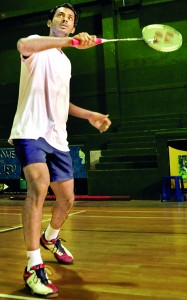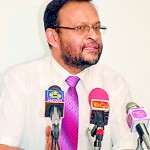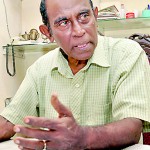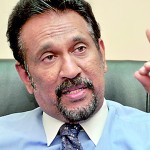Shuttling back and forth with Lanka at the bottom

| Chinthaka Fernando (Former junior national coach)“When you compare things with how they were a few years back you can see that the junior standard has dropped very badly. The main reason for this is that the present and previous presidents didn’t do anything for the sport’s development. That’s what happens when politically appointed people come towards the game. 
“It is really difficult to progress in Asian Badminton when things are like this. And Asian badminton means world badminton. Now there was an era, from 2008 to 2009, when we had a plan and these children were trained for a long time. For example, at that time when I took over the squad we trained for 10 months for a particular Asian Junior Championship where we won medals. It was a systematic process; we got a trainer, physios and doctors. We had a good team. Now what happens is a busload of players is sent for international tournaments and ultimately they end up nowhere. For every tournament they collect a huge amount from youngsters and these players exit in the first round. So how can we break through into the international arena? In local badminton, yes we can do well and people can win tournaments. Someone can be the national champion. But now if you take for instance Niluka Karunaratne; he was preparing for the World Championships without a proper coach Now when you’re preparing for an international competition where the top players are playing you need to go through a proper training programme, especially a player like him who has reached number 36 in the world. In 2009 when our junior players were playing against the Indians and Thais we were going neck-to-neck with them. We got the bronze medal in the girls’ team event and in the girls’ doubles we got golds and also the silver. I’m talking about the Asian tour. But today we can’t even get close to the Indians. The Indian girl (Pusarla) Sidhu played and at that time she was 14. Today she is number 12 in the world. At that time Ratchanok Inthanon was playing and today she is the world number 5 at 18. So how is that we were level with these players in 2009 and are suddenly not near them in 2013. We are not improving. If you want to improve the standard of Sri Lankan badminton we need a systematic programme rather than just sending players. We have qualified people and national champions and we should take the support of everybody, not just a few people. We need to find sponsors. No matter how much we talk, if there is no money then we cannot implement any programmes. And there should be transparency. We must also have a long-term training structure. We should have six or seven days of training. That’s what the Chinese and Koreans do. But with studies sometimes children can’t do this, so we need to provide some sort of academic assistance. What happens is when a tournament is nearby, one or two weeks before it, we have a playing trial and select players for it. Parakrama Basnayake When I took over last year Sri Lanka was ranked 69th in the world and when I left the rank was 26th. I had the luck to send our shuttlers to overseas championships where we were able to claim about nine gold medals. Individually Niluka Karunaratne, Chandrika de Silva, Achini Ratnasiri, Thilini Pramodika, Kavindi Ishadika and Upuli Samanthila won medals for the country. These achievements helped a lot in our standing in world badminton but suddenly it has come to an abrupt halt. There are few reasons behind for that. The first is that there were no international competitions in the recent months and Olympics come once in four years. And the new President of Sri Lanka Badminton has a vision based on professionalism, an aspect I did not possess during my tenure. I worked according to our resources and requirements as we had certain targets to achieve. Now we are facing a sudden change with the new management whilst some of the former programmes being continued for the betterment of the sport. The start looks good and positive but there are weaknesses too. As badminton authorities we had limitations and restrictions. In addition there weren’t any sort of programme in the past to promote the youngsters, especially the school leavers into the sport. Those who ran mainly relied on the well-performing and aging individuals. With this set up Sri Lanka could not think or dream of a better future after the era of the stars. There are future potentials that can bring international glory to the country. In addition the fraternity lacks unity when it comes to a national cause. Also Sri Lanka Badminton is a sport governing body that gets all sorts of negative publicity through the press. This has affected heavily in drawing sponsors to the game to greater heights, despite being an internationally potential sport. If we are to dream big internationally, we must target India and move ahead in the Asian region. Last year we were ahead of India in world rankings. We were on the right track. But when it comes to administration, the hierarchy naturally thinks differently unlike the players. There are positives as well as negatives under the present management. The present chief has a vision to make badminton the top sport in the country but he wants to achieve overall in a greater speed. Practically it’s a tough ask. But he is doing a good thing by getting most of the past players and administrators into an advisory committee. That will help badminton prosper in a big way. Also we should think broader and bolder if we are to progress further. I strongly believe that getting down the services of a foreign coach will immensely help our youngsters and the national players. But there are pity-minded individuals who oppose that move. Traditional way of thinking will only drag badminton into nowhere. Sri Lanka must always think ahead of time, technically and in all aspects to come out of its current condition. LR Ariyananda When the AGM was conducted it was a mess-up, unwanted people came in and six affiliates said they were not participating and that they didn’t agree with the way the AGM was conducted. Then the minister held an inquiry. The inquiry is now over and they called the SLBA three times but no-one has yet come. Now I checked up from the inquiry committee and they said that what we (associations that left the AGM) say is correct, these people (SLBA officials) have messed things up. So what we are trying to do is if they do not give a decision we are going to the President first and present our case and get a decision on this. Another problem is when you are going on a foreign tour you have to prepare yourself. As a former national coach I know that the minimum period to get a player up to standard is one and half months. Now these people are just going on tours without any proper training. They are just selecting the players almost the day before the tournament and sending them and they get knocked out in the first round. This has been happening for the past three years so even the players and the parents think that this is a tour and not an international competition. It is of course different with players like Niluka who really want to do something. He is training hard and also his father is a coach. Now if you look at our juniors, in the Under 16 age group we are close to countries like China and we are better than most other Asian countries. We had a tournament, the Asian Junior Championships, where of our players beat Thai and Malaysian players. Once you reach the age range of 16 to 19 that is when you gain experience and know-how at the international level and that is where our problem is. That is the A-Level period and that age category of players concentrates more on the A-levels than on the game. So however much you ask them to come for training they are not going to come. If you go through the attendance of the national pool you can see this; there will be only four or five players. And correct studies are important. So what we have to avoid the Under 19 group and go for an Under 20 and Under 21 group so that pressure is taken off. Sometime back when Prakash Padukone, who runs the Padukone Academy and was here. There is also an Indian circuit; for about 3 or 4 weekends they should be made to play on that circuit and come back. When they are done with A/L exams and waiting for results that’s when you should catch them. Our planning has to be done according to the country’s environment. That’s not being done. For instance the Sri Lanka Schools Badminton Association is conducting the Inter-Schools Under 19 badminton championships, that is scheduled for February knowing that by June-July players won’t come. But every time this is getting dragged on, so players are just playing. So you are pressuring the players and even the principals are finding it difficult and even parents are saying that it’s not just about badminton, their kids need some sort of qualifications. Suraj Dandeniya (President, Sri Lanka Badminton) As far as I’m concerned badminton in Sri Lanka is dormant. Why I say that is, the present state of badminton is good for Sri Lanka not the world. Other than Niluka Karunaratne and his siblings, others are good at Sri Lanka level. They go for international competitions but are mediocre players who cannot go past the first or sometimes second round. When you take badminton with other sports in Sri Lanka, we are way behind. With due respect to all others who reached greater heights, I’m a complete stranger to badminton. And if badminton was all running well I wouldn’t have been here. It’s a challenge to make sure that I guide the local badminton players to international professionals. I have a period of two years and I’m quite confident of achieving that. As an outsider I saw Sri Lanka Badminton as a place where disharmony prevailed at its best. From the day I took over, every single person had come up to me criticizing another, which clearly depicts the disharmony within the fraternity itself. That’s very unfortunate for badminton. To tell the truth, it’s them who should get together and lift the sport being well-versed individuals in the sport. But unknowingly they have brought disrepute to the sport with cut-throat tactics. Even worse is their tendency to drag the players into their differences of opinion. If the game is in such state no one will come forward to sponsor the sport. Until these experts leave aside differences and unite in the name of the game there will be no future for badminton in Sri Lanka. So my first task was to get former national level badminton players involved and get their help to run the show. So far I have been successful with that mission. The past national champions produced during the concluded two decades have come forward to be a part in the ‘National Badminton Development Committee’ which will be the sole decision-maker in the sport in Sri Lanka. There are certain internal issues where the progress of the sport has been brought to a temporary standstill but we are countering those matters pretty well at the moment. There was a national pool consisting closer to 20 players which I had to disband owing to so many reasons. Sri Lanka Badminton spends closer to Rs. One million a month to maintain these players this includes the expenses of a foreign coach and equipment. The worst part is, only a handful of players named in the pool attend practices, so it’s a waste of time and money, and they have produced very little or no results besides Niluka and some others. The lack of a comprehensive and effective programme was in need. So I made it a point to talk to top corporate firms and get their commitment in helping our potential players to attain professionalism. I also made it a point to talk to each and every player and their parents to get their viewpoint on what changes they think is needed to take place for badminton to prosper. The Sri Lankan domestic tournaments are not played consecutively or in a way help players in their rankings. In addition players do not get cash rewards so that there would be more interest among players. The need of ranking tournaments for juniors as the seniors will be made compulsory, to make the operation smoother in selecting players for international competitions. It’s not going to be an easy way forward I know. We will have to face loads of criticism but eventually it will be an obvious goal we intend to achieve within our term of two years. At the moment people say badminton is a total failure. A failure that has taken place for the past 15 years or so, I won’t be able to straighten things up overnight. But in six months the situation will not be the same. Gradually changes will take place until we at least streamline the nationwide operation under a single parent body. We have planned development at district and provincial levels on our way to reach the top, where badminton players will become professionals as cricketers. |
Follow @timesonlinelk
comments powered by Disqus





